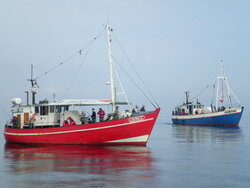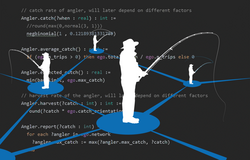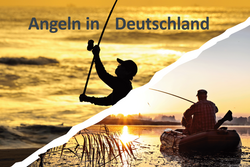Dossier
The importance of marine recreational fisheries: What’s the catch?
Harry Strehlow | 18.11.2025
Recreational anglers take a significant and variable amount of fish from individual stocks, it had to be included in the scientific stock calculation. However, angling is also an economic factor.
Next to commercial fishery, marine recreational fishery plays an important role in terms of the removal of biomass from fish stocks. For certain marine and diadromous species, recreational fishery catches can comprise a significant share of the total landings. At the same time, marine recreational fisheries have high social and economic value. Particularly for coastal and rural, disadvantaged areas, the recreational sector (angling tourism) can be an important source of income.
Despite its importance, research on marine recreational fisheries in Europe is still rather underdeveloped. Until recently, recreational fisheries science in Germany was limited to inland waters. For European marine waters, representative and comprehensive recreational fishery data was missing for the longest time. The regular collection of recreational fishery data in Europe started 2001 with the introduction of the Commission Regulation (EC) No. 1639/2001). More about the historic development
Although in principal recreational and commercial fishers are catching the same fish, they do not compete for the current quota. The quota is calculated on the basis of fished biomass. Up until now, recreational catches have not been considered, because they were unknown. Including recreational catches in future stock assessments raises the perceived productivity of the stock proportionally, increasing the allowable catch by the amount of the recreational removals. Therefore, the total allowable catch of commercial fishery can remain stable, the new, higher, quota just needs to be allocated in a different way. A suitable management should incorporate the interest of the recreational and commercial sector taking into account the high socioeconomic importance of the marine recreational fishery.
Initial investigations showed that recreational cod harvests and releases in the western Baltic Sea were substantial. In fact, the annual recreational removals of German fishery between the years 2005 and 2010 were estimated to be about 50% of the annual German commercial landings from the same area. Studies from other EU Member States in the Baltic Sea, e.g., Denmark and Sweden, showed that recreational removals of cod in the Baltic Sea should not be ignored.
The collection of recreational fishery data such as numbers of fishers and their catch is difficult and complex, associated with a variety of challenges. Read more about data collection in the expertise.
Publications
- 0
Lewin W-C, Weltersbach MS, Strehlow HV (2026) German anglers' views on global warming - implications for climate change monitoring and management. Environ Manag 76(1):20, DOI:10.1007/s00267-025-02291-2
- 1
Dorow M, Weltersbach MS, Strehlow HV, Arlinghaus R (2025) Aalangeln im Fokus der deutschen Wissenschaft. In: Deutscher Angelfischerverband (ed) Fisch des Jahres 2025: Der Europäische Aal (Anguilla anguilla). Berlin: Deutscher Angelfischerverband eV, pp 61-71
- 2
Barz F, Lasner T, Dorrien C von, Döring R, Goti L, Probst WN, Kraus G, Kreiß CM, Krumme U, Reiser S, Schulze T, Stelzenmüller V, Stepputtis D, Simons SL, Strehlow HV, Zimmermann C (2025) An analysis of stakeholders' vision of the future of coastal fisheries in Germany. ICES J Mar Sci 82(6):fsaf074, DOI:10.1093/icesjms/fsaf074
- 3
Magnusson K, Nadolna-Altyn K, Bajinskis J, Bernas R, Dahlgren E, Dannewitz J, Debowski P, Ek C, Ivanauskas E, Kagervall A, Karlsson K, Kesler M, Kontautas A, Leinonen T, Lejk A, Louhi P, Olesen HJ, Pakarinen T, Palm S, Weltersbach MS, et al (2025) Baltic Salmon and Trout Assessment Working Group (WGBAST). Copenhagen: ICES, vi, 378 p, ICES Sci Rep 7(50), DOI:10.17895/ices.pub.29118545
- 4
Strehlow HV, Korzhenevych A, Lucas J, Lewin W-C, Weltersbach MS, Riepe C, Arlinghaus R (2025) Economic impact of resident and nonresident marine anglers to the local economy in Mecklenburg-Western Pomerania, Germany. Fish Manag Ecol 32(3):e12664, DOI:10.1111/fme.12664
- 5
Taylor MI, Lamb PD, Coscia I, Murray DS, Brown M, Cameron TC, Davison P, Freeman HA, Georgiou K, Grati F, Haugen T, Karachle PK, Kennedy R, Lanssens T, Lincoln H, Martinho F, McCarthy I, Petroutsos S-I, Pita P, Weltersbach MS, et al (2025) High-density SNP panel provides little evidence for population structure in European sea bass (Dicentrarchus labrax) in waters surrounding the UK. ICES J Mar Sci 82(5):fsaf064, DOI:10.1093/icesjms/fsaf064
- 6
Koemle D, Pascoe S, Weltersbach MS, Gassler B, Arlinghaus R (2025) How quota cuts, recreational fishing, and predator conservation can shape coastal commercial fishery efforts. Can J Fish Aquat Sci 82(1):1-20, DOI:10.1139/cjfas-2024-0081
- 7
Barz F, Brüning S, Döring R, Lasner T, Strehlow HV (2025) National fisheries profile Germany. Braunschweig: Johann Heinrich von Thünen-Institut, 93 p, Thünen Rep 120, DOI:10.3220/253-2025-140
- 8
Weltersbach MS, Lewin W-C, Haase K, Funk S, Ferter K, Strehlow HV (2025) Selektivität und Überlebensraten nach dem Zurücksetzen in der Angelfischerei auf Plattfische. Braunschweig: Johann Heinrich von Thünen-Institut, 49 p, Thünen Working Paper 262, DOI:10.3220/253-2025-4
- 9
Lewin W-C, Pierce ME, Arlinghaus R, Weltersbach MS, Strehlow HV (2025) Stakeholder workshops on western Baltic cod fisheries-conflict and consensus in the face of a highly dynamic ecosystem. Biol Conserv 302:110983, DOI:10.1016/j.biocon.2025.110983
- 10
Pita P, Tracey S, Arlinghaus R, Bachiller E, Pinho-Duarte F, Ferter K, Henriques F, Hook S, Hyder K, Irigoyen A, Jiménez MP, Laporta M, Lejk AM, Leonard E, Olesen HJ, Palmer F, Pavicic M, Pontes J, Strehlow HV, Weltersbach MS, et al (2025) Staying hooked: Effective science engagement and communication in recreational fisheries. Front Mar Sci 12:1589544, DOI:10.3389/fmars.2025.1589544
- 11
Hyder K, Mugerza E, Bachiller E, Bolognini I, Bova C, Chen C, Colella S, de Groote A, Dragicevic B, Duarte F, Edwards W, Farthing M, Ferter K, Foster J, Farrell G, Freitas Henriques F, García Asorey M, Wischnewski J, Weltersbach MS, Strehlow HV, et al (2025) Working Group on Recreational Fisheries Surveys (WGRFS). Copenhagen: ICES, iii, 53 p, ICES Sci Rep 7(118), DOI:10.17895/ices.pub.30979615
- 12
Weltersbach MS, Lewin W-C, Haase K, Eckardt J, Strehlow HV (2024) 20 Years of Work on Marine Recreational Fisheries at the Thünen Institute of Baltic Sea Fisheries. Braunschweig: Johann Heinrich von Thünen-Institut, 87 p, Thünen Working Paper 234, DOI:10.3220/WP1710484687000
- 13
Strehlow HV, Weltersbach MS, Lewin W-C, Arlinghaus R, Becker O, Bronnmann J (2024) Angeln auf Dorsch. In: Deutscher Angelfischerverband (ed) Fisch des Jahres 2024: Der Dorsch oder Kabeljau (Gadus morhua). Berlin: Deutscher Angelfischerverband eV, pp 71-80
- 14
Nadolna-Altyn K, Magnusson K, Bajinskis J, Bernas R, Dahlgren E, Dannewitz J, Debowski P, Ek C, Ivanauskas E, Kagervall A, Karlsson K, Kesler M, Kontautas A, Leinonen T, Lejk AM, Louhi P, Olesen HJ, Pakarinen T, Palm S, Weltersbach MS, et al (2024) Baltic Salmon and Trout Assessment Working Group (WGBAST). Copenhagen: ICES, vi, 425 p, ICES Sci Rep 6(42), DOI:10.17895/ices.pub.25868665
- 15
Grati F, Hyder K, Mugerza E, Arlinghaus R, Baudrier J, Bell B, Bolognini L, De Groote AI, Diogo H, Haase K, Pita P, Potts W, Radford Z, Regimbart A, Scanu M, Skov C, Udzups D, Verleye T, Volstad JH, Weltersbach MS, Strehlow HV (2024) Effective governance of marine recreational fisheries in Europe is needed to maximize the societal benefits of its fisheries. ICES J Mar Sci: Online First, Dec 2024, DOI:10.1093/icesjms/fsae169
- 16
Lewin W-C, Weltersbach MS, Strehlow HV (2024) Eine Charakterisierung der marinen Angelfischerei in Deutschland - Besonderheiten und Perspektiven. Z Fischerei 2023(3):13, DOI:10.35006/fischzeit.2023.35
- 17
Lewin W-C, Sühring R, Fries E, Solomon M, Brinkmann M, Weltersbach MS, Strehlow HV, Freese M (2024) Soft plastic fishing lures as a potential source of chemical pollution - Chemical analyses, toxicological relevance, and anglers' perspectives. Sci Total Environ 946:173884, DOI:10.1016/j.scitotenv.2024.173884
- 18
Lewin W-C, Weltersbach MS, Eckardt J, Strehlow HV (2024) Stakeholder-Beteiligung - Erkenntnisse und Perspektiven für ein nachhaltiges Fischereimanagement. Braunschweig: Johann Heinrich von Thünen-Institut, 92 p, Thünen Rep 115, DOI:10.3220/REP1719403842000
- 19
Kammann UKR, Aust M-O, Lewin W-C, Nogueira P, Panten K, Sell AF, Stepputtis D, Strehlow HV, Weltersbach MS, Wysujack K (2024) Umweltkontamination: Müll in deutschen Meeresgebieten. Braunschweig: Johann Heinrich von Thünen-Institut, 6 p, Thünen à la carte 13, DOI:10.3220/CA1701080947000
- 20
Barz K, Strehlow HV, Arlinghaus R, Korzhenevych A, Meyer S, Zimmermann C (2024) Wirtschaftliche Bedeutung des Kabeljaus oder Dorsches. In: Deutscher Angelfischerverband (ed) Fisch des Jahres 2024: Der Dorsch oder Kabeljau (Gadus morhua). Berlin: Deutscher Angelfischerverband eV, pp 17-21
- 21
Mugerza E, Hyder K, Lejk A, Winkler A, Regimbart A, Papadopoulos A, Kagervall A, Winter A-M, de Groote A, Kontautas A, Dragicevic B, Skov C, Chen C, Bova C, Zilniece D, Vertegaal D, Ryan D, Udzups D, Strehlow HV, Weltersbach MS, et al (2024) Working Group on Recreational Fisheries Surveys (WGRFS). Copenhagen: ICES, iii, 46 p, ICES Sci Rep 6(106), DOI:10.17895/ices.pub.28008698
- 22
Hyder K, Mugerza E, Alvarado DJ, Atterborne A, Bachiller E, Baudrier J, Bolognini L, Bouch P, Bova C, Brown A, Chun C, Colella S, Curtis D, de Groote A, Diogo HM, Dumpis J, Edwards W, Haase K, Strehlow HV, Weltersbach MS, et al (2024) Working Group on Recreational Fisheries Surveys (WGRFS; outputs from 2023 meeting). Copenhagen: ICES, iv, 52 p, ICES Sci Rep 6(11), DOI:10.17895/ices.pub.25067702
- 23
Höjesjö J, Walker A, Aarestrup K, Alexandre C, Artero C, Austad B, Bajinskis J, Bernas R, Berry M, Davidsen JG, Davidson I, Davison P, de Eyto E, Debowski P, Diserud O, Elliott S, Ensing D, Finstad B, Fitzgerald C, Weltersbach MS, et al (2024) Working Group to Develop and Test Assessment Methods for Sea Trout Populations (anadromous Salmo trutta) (Outputs from 2020-2023 Meetings) (WGTRUTTA). Copenhagen: ICES, iii, 29 p, ICES Sci Rep 6(88), DOI:10.17895/ices.pub.27169515
- 24
Scanu M, Radford Z, Curtis D, Udzups D, Bachiller E, Mugerza E, Lambert G, Olesen HJ, Thasitis I, Sics I, White J, Ryan KL, Hyder K, Nedreaas K, van de Pol L, Zarauz L, Koutrakis M, Storr-Paulsen M, Farthing M, Weltersbach MS, et al (2024) Workshop on recreational fisheries in stock assessments (WKRFSA). Copenhagen: ICES, i, 35 p, ICES Sci Rep 6(26), DOI:10.17895/ices.pub.25333498
- 25
Arlinghaus R, Friedland R, Roser P, Niessner D, Lewin W-C, Dorow M, Westphal L (2023) 1.4 Menschgemachte und natürliche Umweltveränderungen an den Bodden. Berichte des IGB 33:68-79, 84-97, DOI:10.4126/FRL01-006453300
- 26
Arlinghaus R, Koemle D, Riepe C, Strehlow HV, Weltersbach MS, Lewin W-C (2023) 2.2 Angelfischerei. Berichte des IGB 33:121-135, DOI:10.4126/FRL01-006453300
- 27
Strehlow HV, Arlinghaus R, Weltersbach MS, Koemle D, Korzhenevych A (2023) 4.4 Volkswirtschaftliche und touristische Bedeutung der (angel)fischereilichen Nutzung von Boddenhechten. Berichte des IGB 33:389-402, DOI:10.4126/FRL01-006453300
- 28
Arlinghaus R, Rittweg T, Dhellemmes F, Koemle D, van Gemert R, Schubert H, Niessner D, Möller S, Droll J, Friedland R, Lewin W-C, Dorow M, Westphal L, Ehrlich E, Strehlow HV, Weltersbach MS, Roser P, Braun M, Feldhege F, Winkler H (2023) A synthesis of a coastal northern pike (Esox lucius) fishery and its social-ecological environment in the southern Baltic Sea: Implications for the management of mixed commercial-recreational fisheries. Fish Res 263:106663, DOI:10.1016/j.fishres.2023.106663
- 29
Haase K, Reinhardt O, Lewin W-C, Weltersbach MS, Strehlow HV, Uhrmacher AM (2023) Agent-based simulation models in fisheries science. Rev Fish Sci Aquacult 31(3):372-395, DOI:10.1080/23308249.2023.2201635
- 30
Kesler M, Bajinskis J, Bernas R, Dahlgren E, Dannewitz J, Debowski P, Olesen HJ, Kagervall A, Kesminas V, Kontautas A, Leinonen T, Lejk AM, Louhi P, Magnusson K, Nadolna-Altyn K, Pakarinen T, Palm S, Pedersen S, Weltersbach MS, Strehlow HV, et al (2023) Baltic Salmon and Trout Assessment Working Group (WGBAST). Copenhagen: ICES, iv, 451 p, ICES Sci Rep 5(53), DOI:10.17895/ices.pub.22800983
- 31
Lewin W-C, Weltersbach MS, Haase K, Arlinghaus R, Strehlow HV (2023) Change points in marine recreational fisheries - the impact of stock status and fisheries regulations: A case from the western Baltic Sea. Fish Res 258:106548, DOI:10.1016/j.fishres.2022.106548
- 32
Britton JR, Pinder AC, Alós J, Arlinghaus R, Danylchuk AJ, Edwards W, Freire KMF, Gundelund C, Hyder K, Jaric I, Lennox R, Lewin W-C, Lynch AJ, Midway SR, Potts WM, Ryan KL, Skov C, Strehlow HV, Tracey SR, Weltersbach MS, et al (2023) Global responses to the COVID-19 pandemic by recreational anglers: considerations for developing more resilient and sustainable fisheries. Rev Fish Biol Fisheries 33(4):1095-1111, DOI:10.1007/s11160-023-09784-5
- 33
Simon J, Ubl C, Lewin W-C, Dorow M (2023) Infection with swim bladder nematode Anguillicola crassus in relation to European eel growth, age, and habitat along the German Baltic coast. Dis Aquat Organ 155:21-33, DOI:10.3354/dao03739
- 34
Jepsen N, Skov C, Kristensen ML, Larsen MH, Lewin W-C, Gundelund C, Weltersbach MS, Ferter K, Koed A (2023) Kritiske elementer i bestandsvurderingsmodeller for aal og havørred. Silkeborg: DTU Aqua, 57 p, DTU Aqua Rep 416-2022
- 35
Simon J, Lewin W-C, Fladung E (2023) Length-weight relations for 19 freshwater fish species (Actinopterygii) from the lowland Elbe River, Germany. Acta Ichth Piscat 53:129-135, DOI:10.3897/aiep.53.107199
- 36
Skov C, Ferter K, Jepsen N, Pedersen L-F, Lewin W-C, Gundelund C, Weltersbach MS (2023) Post-release effects of catch and release angling for sea trout: Mortality, growth and wound healing. Fish Res 261:106637, DOI:10.1016/j.fishres.2023.106637
- 37
Lewin W-C, Weltersbach MS, Haase K, Riepe C, Strehlow HV (2023) Potential biases in angler diary data: The impact of the diarist recruitment process on participation rates, catch, harvest, and effort estimates. Fish Res 258:106551, DOI:10.1016/j.fishres.2022.106551
- 38
Adamowicz M, Reis DCC, Egekvist J, Paumier A, Fernandes AC, Gadgaard Boye A, Hasslow A, Hilvarsson A, Kontautas A, Stransky C, Rosa C, Espino García D, Udzups D, Rasmann E, Strehlow HV, Ulleweit J, Freese M, Bernreuther M, Stötera S, Krumme U, et al (2023) Regional Coordination Group North Atlantic, North Sea & Eastern Arctic and Regional Coordination Group Baltic: Part I Report, 79 p; Part II Decisions and Recommendations, 13 p; Part III Intersessional Subgroup (ISSG) 2022-2023 Reports, 320 p [online]. , zu finden in <https://www.fisheries-rcg.eu/rcg-nansea/> [zitiert am 31.01.2024]
- 39
Lewin W-C, Dorow M, Henseler C, Oesterwind D, Weltersbach MS, Strehlow HV (2023) Temporal development of fish communities in brackish lagoons of the Baltic Sea considering the invasion of the non-indigenous round goby (Neogobius melanostomus). Reg Studies Mar Sci 62:102953, DOI:10.1016/j.rsma.2023.102953
- 40
Fowler AM, Dowling NA, Lyle JM, Alós J, Anderson LE, Cooke SJ, Danylchuk AJ, Ferter K, Folpp H, Hutt C, Hyder K, Lew DK, Lowry MB, Lynch TP, Meadows N, Mugerza E, Nedreaas K, Garrone-Neto D, Ochwada-Doyle FA, Strehlow HV, et al (2023) Toward sustainable harvest strategies for marine fisheries that include recreational fishing. Fish Fisheries 24(6):1003-1019, DOI:10.1111/faf.12781
- 41
Fuller JL, Strehlow HV, Schmidt JO, Bodin Ö, Dankel DJ (2023) Tracking integrated ecosystem assessments in the ICES network: a social network analysis of the ICES expert groups. ICES J Mar Sci 80(2):282–294, DOI:10.1093/icesjms/fsac242
- 42
Lewin W-C, Barz F, Weltersbach MS, Strehlow HV (2023) Trends in a European coastal fishery with a special focus on small-scale fishers - Implications for fisheries policies and management. Mar Policy 155:105680, DOI:10.1016/j.marpol.2023.105680
- 43
Bronnmann J, Koemle D, Meyerhoff J, Weltersbach MS, Strehlow HV, Arlinghaus R (2023) Willingness to pay for harvest regulations and catch outcomes in recreational fisheries: A stated preference study of German cod anglers. Fish Res 259(März 2023):106536, DOI:10.1016/j.fishres.2022.106536
- 44
Hyder K, Mugerza E, Atterbury A, Bachiller E, Baudrier J, Bayes J, Bell B, Bolognini L, Bouch P, Brown A, Diogo HMC, Chen C, Colella S, Curtis D, de Groote A, Dumpis J, Edwards W, Ferter K, Haase K, Weltersbach MS, et al (2023) Working Group on Recreational Fisheries Surveys (WGRFS; outputs from 2022 meeting). Copenhagen: ICES, iii, 69 p, ICES Sci Rep 5(27), DOI:10.17895/ices.pub.22211674
- 45
Skov C, Gundelund C, Weltersbach MS, Ferter K, Bertelsen SK, Jepsen N (2022) Catch and release angling for sea trout explored by citizen science: Angler behavior, hooking location and bleeding patterns. Fish Res 255:106451, DOI:10.1016/j.fishres.2022.106451
- 46
Lamb PD, Randall P, Weltersbach MS, Andrews B, Hyder K (2022) Estimating discard survival of European sea bass (Dicentrarchus labrax) in the UK commercial hook-and-line fishery. Fish Manag Ecol 29(2):105-114, DOI:10.1111/fme.12518
- 47
Ferter K, Otteraa H, Christman M, Kleiven AR, Weltersbach MS, Gundersen S, Djønne C, Bjelland O, Hartill BW, Lyle JM, Hyder K, Borch T, Vølstad JH (2022) Integrating complementary survey methods to estimate catches in Norway's complex marine recreational hook-and-line fishery. ICES J Mar Sci 80(1):107–121, DOI:10.1093/icesjms/fsac216
- 48
Haase K, Weltersbach MS, Lewin W-C, Zimmermann C, Strehlow HV (2022) Potential effects of management options on marine recreational fisheries - the example of the western Baltic cod fishery. ICES J Mar Sci 79(3):661-676, DOI:10.1093/icesjms/fsac012
- 49
Haase K, Strehlow HV, Lewin W-C, Reinhardt O, Uhrmacher AM (2022) Site choice in recreational fisheries - towards an agent-based approach. In: Feng B, Pedrielli G, Peng Y, Shashaani S, Song E, Corlu CG, Lee LH, Chew EP, Roeder T, Lendermann P (eds) Proceedings of the 2022 Winter Simulation Conference (WSC), 11-14 Dec. 2022, Singapore. Piscataway, NJ, USA: IEEE, pp 819-830, DOI:10.1109/WSC57314.2022.10015240
- 50
Krumme U, Meyer S, Kratzer I, Chladek J-C, Barz F, Stepputtis D, Strehlow HV, Kraak SBM, Zimmermann C (2022) STELLA - Stellnetzfischerei-Lösungsansätze : Projekt-Abschlussbericht. Braunschweig: Johann Heinrich von Thünen-Institut, 220 p, Thünen Rep 97, DOI:10.3220/REP1662104969000
- 51
Pietrock M, Ritterbusch D, Lewin W-C, Shumka S, Spirkovski Z, Ilik-Boeva D, Brämick U, Peveling R (2022) The fish community of the ancient Prespa Lake (Southeast Europe): Non-indigenous species take over. Fish Aquat Life 30(3):112-124, DOI:10.2478/aopf-2022-0011
- 52
Kesler M, Amosova V, Bajinskis J, Bernas R, Dahlgren E, Dannewitz J, Debowski P, Kagervall A, Koljonen M-L, Kontautas A, Leinonen T, Lejk AM, Magnusson K, Mäntyniemi S, Nadolna-Altyn K, Pakarinen T, Palm S, Pedersen S, Strehlow HV, Weltersbach MS, et al (2021) Baltic Salmon and Trout Assessment Working Group (WGBAST). Copenhagen: ICES, 331 p, ICES Sci Rep 3(26), DOI:10.17895/ices.pub.7925
- 53
Storr-Paulsen M, Alade L, Andersen M, Balestri E, Berg CW, Baudron A, Brown E, Cadrin S, Coull K, De Oliveira J, Dingsør GE, Dobby H, Ellis JR, Fallon N, Girardin R, Hyder K, Jaworski A, Junge C, Kempf A, Weltersbach MS, et al (2021) Benchmark workshop on North Sea stocks (WKNSEA). Copenhagen: ICES, 756 p, ICES Sci Rep 3(25), DOI:10.17895/ices.pub.7922
- 54
van Marlen B, Olsen RE, Vold A, Arregi L, Depestele J, Ferter K, Noak T, Strehlow HV, Mehault S, Breen M (2021) Captive observations. ICES Coop Res Rep 351:64-78, DOI:10.17895/ices.pub.8006
- 55
Lewin W-C, Weltersbach MS, Haase K, Riepe C, Skov C, Gundelund C, Strehlow HV (2021) Comparing on-site and off-site survey data to investigate survey biases in recreational fisheries data. ICES J Mar Sci 78(7):2528-2546, DOI:10.1093/icesjms/fsab131
- 56
Skov C, Hyder K, Gundelund C, Ahvonen A, Baudrier J, Borch T, Carvalho Sde, Erzini K, Ferter K, Grati F, Van der Hammen T, Hinriksson J, Houtman R, Kagervall A, Kapiris K, Karlsson M, Lejk AM, Lyle JM, Strehlow HV, Weltersbach MS, et al (2021) Expert opinion on using angler Smartphone apps to inform marine fisheries management: status, prospects, and needs. ICES J Mar Sci 78(3):967-978, DOI:10.1093/icesjms/fsaa243
- 57
Uhlmann S, Quirijns F, Depestele J, Strehlow HV, Ferter K, Weltersbach MS, Nilsson H, Mehault S (2021) Explanatory variables. ICES Coop Res Rep 351:39-50, DOI:10.17895/ices.pub.8006
- 58
Pita P, Ainsworth GB, Alba B, Anderson AB, Antelo M, Alós J, Artetxe I, Baudrier J, Castro JJ, Chicharro B, Erzini K, Ferter K, Freitas M, Garcia-de-la-Fuente L, Garcia-Charton J, Gimenez-Casalduero M, Grau AM, Diogo HM, Strehlow HV, Weltersbach MS, et al (2021) First assessment of the impacts of the COVID-19 pandemic on global marine recreational fisheries. Front Mar Sci 8:735741, DOI:10.3389/fmars.2021.735741
- 59
Arlinghaus R, Lucas J, Weltersbach MS, Kömle D, Winkler HM, Riepe C, Kühn C, Strehlow HV (2021) Niche overlap among anglers, fishers and cormorants and their removals of fish biomass: A case from brackish lagoon ecosystems in the southern Baltic Sea. Fish Res 238:105894, DOI:10.1016/j.fishres.2021.105894
- 60
Weltersbach MS, Riepe C, Lewin W-C, Strehlow HV (2021) Ökologische, soziale und ökonomische Dimensionen des Meeresangelns in Deutschland. Braunschweig: Johann Heinrich von Thünen-Institut, 210 p, Thünen Rep 83, DOI:10.3220/REP1611578297000
- 61
Dorow M, Lewin W-C, Lill D, Ubl C, Frankowski J (2021) Using logbook-based catch-rate data to detect yellow eel population trends in the southern Baltic Sea. Fish Manag Ecol 28(6):564-572, DOI:10.1111/fme.12505
- 62
Lewin W-C, Weltersbach MS, Haase K, Strehlow HV (2021) Who travels how far: German Baltic sea anglers’ travel distances as precondition for fisheries management and coastal spatial planning. Ocean Coastal Manag 209:105640, DOI:10.1016/j.ocecoaman.2021.105640
- 63
Hyder K, Mugerza E, Ahvonen A, Baudrier J, Beukhof E, Colella S, de Groote A, Dedeu Dunton AL, Diogo HM, Ferter K, García Asorey M, Gordoa Ezquerra A, Grati F, Hartill BW, Hinriksson J, Jiménez Alvarado D, Kagervall A, Kairyte L, Strehlow HV, Weltersbach MS, et al (2021) Working Group on Recreational Fisheries Surveys (WGRFS). Copenhagen: ICES, 54 p, ICES Sci Rep 3(113), DOI:10.17895/ices.pub.9673
- 64
Bogstad B, Vermard Y, Bell ED, Boje J, Cronne-Grigorov L, Dolder PJ, Fall J, Kristinsson K, Krumme U, Lamoni L, Lordan C, Martinez I, Millar S-L, Moore C, Ojaveer H, Readdy L, Roux M-J, Sköld M, Stötera S, Strehlow HV, Windsland K (2021) Workshop on fisheries overviews (WKFO). Copenhagen: ICES, 98 p, ICES Sci Rep 3(45), DOI:10.17895/ices.pub.8077
- 65
Barz F, Eckardt J, Meyer S, Kraak SBM, Strehlow HV (2020) "Boats don't fish, people do"- how fishers' agency can inform fisheries-management on bycatch mitigation of marine mammals and sea birds. Mar Policy 122:104268, DOI:10.1016/j.marpol.2020.104268
- 66
Watson JW, Hyder K, Boyd R, Thorpe R, Weltersbach MS, Ferter K, Cooke SJ, Roy S, Sibly RM (2020) Assessing the sublethal impacts of anthropogenic stressors on fish: An energy-budget approach. Fish Fisheries 21(5):1034-1045, DOI:10.1111/faf.12487
- 67
Amosova V, Boje J, Brown E, Carlshamre S, Eero M, Gröhsler T, Gutkowska J, Haase S, Hommik K, Horbowy J, Jounela P, Kaljuste O, Karpushevskaia A, Krumme U, Lövgren J, Mirny Z, Neuenfeldt S, Schade FM, Stötera S, Strehlow HV, et al (2020) Baltic Fisheries Assessment Working Group (WGBFAS). Copenhagen: ICES, 643 p, ICES Sci Rep 2(45), DOI:10.17895/ices.pub.6024
- 68
Hartill BW, Taylor SM, Keller K, Weltersbach MS (2020) Digital camera monitoring of recreational fishing effort: Applications and challenges. Fish Fisheries 21(1):204-215, DOI:10.1111/faf.12413
- 69
Clay PM, Ferretti J, Bailey J, Dunkel D, Elegbede I, Fraga A, Fuller J, Goldsborough D, Goti L, Groenevold R, Hamon KG, Kellner J, Martin KS, Pedreschi D, Röckmann C, Santurtun M, Stephenson R, Strehlow HV (2020) ICES Working group on maritime systems (WGMARS). Copenhagen: ICES, 22 p, ICES Sci Rep 2(63), DOI:10.17895/ices.pub.6104
- 70
Lewin W-C, Weltersbach MS, Denfeld G, Strehlow HV (2020) Recreational anglers’ perceptions, attitudes and estimated contribution to angling related marine litter in the German Baltic Sea. J Environ Manag 272:111062, DOI:10.1016/j.jenvman.2020.111062
- 71
Ferter K, Hyder K, Ahvonen A, Baudrier J, Colella S, de Groote A, Dedeu Dunton AL, Diogo HM, Ezquerra AG, Grati F, Hartill BW, Hinriksson J, Alvarado DJ, Kagervall A, Kairyte L, Karachle P, Karlsson M, Laporta M, Lejk AM, Weltersbach MS, et al (2020) Working Group on Recreational Fisheries Surveys (WGRFS). Copenhagen: ICES, 57 p, ICES Sci Rep 2(102), DOI:10.17895/ices.pub.7563
- 72
Ferter K, Hyder K, Ahvonen A, Baudrier J, Diogo HM, Dunton A, Gordoa A, Grati F, Hartill BW, Hinriksson J, Alvarado DJ, Kagervall A, Kairyté L, Kapiris K, Karlsson M, Lafon J, Laporta M, Lejk AM, Strehlow HV, Weltersbach MS (2020) Working Group on Recreational Fisheries Surveys (WGRFS; outputs from 2019 meeting). Copenhagen: ICES, 78 p, ICES Sci Rep 2(1), DOI:10.17895/ices.pub.5744
- 73
Höjesjö J, Walker A, Aarestrup K, Alexandre C, Bernas R, Debowski P, Degerman E, Davidsen J, Davidson I, Diserud O, Ensing D, Finstad B, Finlay R, Jonsson B, Josset Q, Kagervall A, Kennedy R, Kesler M, Strehlow HV, Weltersbach MS, et al (2020) Working Group with the Aim to Develop Assessment Models and Establish Biological Reference Points for Sea Trout (Anadromous Salmo trutta) Populations (WGTRUTTA; outputs from 2019 meeting). Copenhagen: ICES, 59 p, ICES Sci Rep 2(59), DOI:10.17895/ices.pub.7431
- 74
Rau A, Lewin W-C, Zettler ML, Gogina M, Dorrien C von (2019) Abiotic and biotic drivers of flatfish abundance within distinct demersal fish assemblages in a brackish ecosystem (western Baltic Sea). Estuar Coast Shelf Sci 220:38-47, DOI:10.1016/j.ecss.2019.02.035
- 75
Amosova V, Berg C, Boje J, Cardinale M, Carlshamre S, Eero M, Gröhsler T, Gutkowska J, Hommik K, Horbowy J, Huwer B, Jounela P, Kaljuste O, Karpushevskiy I, Klinger R, Krumme U, Rodriguez-Tress P, Schade FM, Stötera S, Strehlow HV, et al (2019) Baltic Fisheries Assessment Working Group (WGBFAS). Copenhagen: ICES, 653 p, ICES Sci Rep 1(20), DOI:10.17895/ices.pub.5256
- 76
Lewin W-C, Weltersbach MS, Denfeld G, Strehlow HV (2019) Bedeutung und Bewertung von Meeresmüll aus der marinen Freizeitfischerei und Maßnahmen zur Vermeidung : Endbericht ; erstellt im Auftrag des NLWKN und des LUNG M-V. Rostock: Thünen-Institut für Ostseefischerei, 114 p
- 77
Moesgaard Albertsen C, Amosova V, Andersen M, Behrens JW, Willestofte Berg C, Bergenius M, Brander K, Cardinale M, Carlshamre S, Casini M, Cormon X, Eero M, Gertseva V, Haase S, Krumme U, McQueen K, Pierce ME, Schade FM, Strehlow HV, Weltersbach MS, et al (2019) Benchmark workshop on Baltic cod stocks (WKBALTCOD2). Copenhagen: ICES, 310 p, ICES Sci Rep 1(9), DOI:10.17895/ices.pub.4984
- 78
Weltersbach MS, Lewin W-C, Gröger JP, Strehlow HV (2019) Effect of lure and bait type on catch, size, hooking location, injury and bycatch in the western Baltic Sea recreational cod fishery. Fish Res 210:121-130, DOI:10.1016/j.fishres.2018.10.002
- 79
Belschner T, Ferretti J, Strehlow HV, Kraak SBM, Döring R, Kraus G, Kempf A, Zimmermann C (2019) Evaluating fisheries systems: A comprehensive analytical framework and its application to the EU’s common fisheries policy. Fish Fisheries 20(1):97-109, DOI:10.1111/faf.12325
- 80
Volstad JH, Christman M, Ferter K, Kleiven AR, Ottera H, Aas Ø, Arlinghaus R, Borch T, Colman J, Hartill BW, Haugen TO, Hyder K, Lyle JM, Junker Ohldieck M, Skov C, Strehlow HV, Voorhees D van, Weltersbach MS, Weber ED (2019) Field surveying of marine recreational fisheries in Norway using a novel spatial sampling frame reveals striking under-coverage of alternative sampling frames. ICES J Mar Sci 77(6):2192-2205, DOI:10.1093/icesjms/fsz108
- 81
Lewin W-C, Weltersbach MS, Ferter K, Hyder K, Mugerza E, Prellezo R, Radford Z, Zarauz L, Strehlow HV (2019) Potential environmental impacts of recreational fishing on marine fish stocks and ecosystems. Rev Fish Sci Aquacult 27(3):287-330, DOI:10.1080/23308249.2019.1586829
- 82
Clay PM, Ferretti J, Röckmann C, Saturntún M, Bailey J, Dankel DJ, Dickey-Collas M, Fraga A, Gaichas S, Gardner S, Goldsborough D, Goti L, Groeneveld RA, Hamon KG, Kenny A, Kraan M, Lucey S, Mangi S, Münch A, Strehlow HV, et al (2019) Working group on maritime systems (WGMARS). Copenhagen: ICES, 15 p, ICES Sci Rep 1(88), DOI:10.17895/ices.pub.5712
- 83
Pita P, Villasante S, Arlinghaus R, Gomes P, Strehlow HV, Veiga P, Vingada J, Hyder K (2018) A matter of scales: Does the management of marine recreational fisheries follow the ecosystem approach to fisheries in Europe? Mar Policy 97:61-71, DOI:10.1016/j.marpol.2018.08.039
- 84
Weltersbach MS (2018) Einbezug der Sterblichkeit von Rückwürfen in der Freizeitfischerei in das europäische Fischereimanagement. Rostock: Univ, Mathematisch-Naturwissenschaftliche Fakultät, 115 p, Rostock, Univ, Mathematisch-Naturwissenschaftliche Fakultät, Diss, 2018, DOI:10.18453/rosdok_id00002306
- 85
Weltersbach MS, Strehlow HV, Ferter K, Klefoth T, Graaf M de, Dorow M (2018) Estimating and mitigating post-release mortality of European eel by combining citizen science with a catch-and-release angling experiment. Fish Res 201:98-108, DOI:10.1016/j.fishres.2018.01.010
- 86
Lewin W-C, Strehlow HV, Ferter K, Hyder K, Niemax J, Herrmann JP, Weltersbach MS (2018) Estimating post-release mortality of European sea bass based on experimental angling. ICES J Mar Sci 75(4):1483–1495, DOI:10.1093/icesjms/fsx240
- 87
Hyder K, Weltersbach MS, Armstrong M, Strehlow HV, et al (2018) Recreational sea fishing in Europe in a global context : participation rates, fishing effort, expenditure, and implications for monitoring and assessment. Fish Fisheries 19(2):225-243, DOI:10.1111/faf.12251
- 88
Radford Z, Hyder K, Zarauz L, Mugerza E, Ferter K, Prellezo R, Strehlow HV, Townhill B, Lewin W-C, Weltersbach MS (2018) The impact of marine recreational fishing on key fish stocks in European waters. PLOS One 13(9):e0201666, DOI:10.1371/journal.pone.0201666
- 89
Weltersbach MS, Strehlow HV, Klefoth T, Ferter K, Dorow M (2017) Auswirkungen des Fangens und Zurücksetzens von Aalen in der Angelfischerei [online]. Fischerei Fischmarkt MV(4):44-46, zu finden in <http://www.lfvmv.de/download/zeitschrift/FF_4_2017.pdf> [zitiert am 05.01.2018]
- 90
Weltersbach MS, Strehlow HV, Klefoth T, Ferter K, Dorow M (2017) Auswirkungen des Fangens-und-Zurücksetzens von Aalen in der Angelfischerei - Vorstellung verschiedener Versuchsansätze. Mitt Landesforschungsanst Landwirtsch Fischerei Mecklenburg Vorpommern 58:77-88
- 91
Arlinghaus R, Weltersbach MS (2017) Catch & Release. Meer Küste(6):23
- 92
Strehlow HV (2017) Die Sache mit dem Angelhaken .... Meer Küste(6):21
- 93
Strehlow HV, Weltersbach MS (2017) Jobmotor Meeresangeln - Zwei aktuelle Studien belegen: Meeresangeln ist ein bedeutender Wirtschaftsfaktor in Europa [online]. Fischerei Fischmarkt MV(4):38-40, zu finden in <http://www.lfvmv.de/download/zeitschrift/FF_4_2017.pdf> [zitiert am 05.01.2018]
- 94
Strehlow HV (2017) Quote für Angler. Meer Küste(6):28
- 95
Hyder K, Radford Z, Prellezo R, Weltersbach MS, Lewin W-C, Zarauz L, Ferter K, Ruiz J, Townhill B, Mugerza E, Strehlow HV (2017) Research for PECH Committee - Marine recreational and semi-subsistence fishing - its value and its impact on fish stocks : Study. Luxembourg: European Commission, DOI:10.2861/2728
- 96
Weltersbach MS, Ferter K, Sambraus F, Strehlow HV (2016) Hook shedding and post-release fate of deep-hooked European eel. Biol Conserv 199:16-24, DOI:10.1016/j.biocon.2016.04.015
- 97
Kraak SBM, Dorrien C von, Krumme U, Nordheim L von, Oeberst R, Strehlow HV, Zimmermann C (2016) The discard ban and its impact on the MSY objective - The Baltic Sea. In: Research for PECH Committee - The discard ban and its impact on the maximum sustainable yield objective on fisheries : workshop. Brussels: European Union, pp 137-194
- 98
Ferter K, Weltersbach MS, Humborstad OB, Fjelldal PG, Sambraus F, Strehlow HV, Volstad JH (2015) Dive to survive: effects of capture depth on barotrauma and post-release survival of Atlantic cod (Gadus morhua) in recreational fisheries. ICES J Mar Sci 72(8):2467-2481, DOI:10.1093/icesjms/fsv102
- 99
Eero M, Strehlow HV, Adams CM, Vinther M (2015) Does recreational catch impact the TAC for commercial fisheries? ICES J Mar Sci 72(2):450-457, DOI:10.1093/icesjms/fsu121
- 100
Fey DP, Lejk AM, Margonski P, Szymanek L, Psuty I, Nermer T, Lempe F, Strehlow HV, Polte P, Moll D, Stybel N, Hiller A, Laak M van (2014) Herring : an analysis of spawning ground management, ecological conditions and human impacts in Greifswald Bay, Vistula Lagoon and Hanö Bight [online]. Malmö: Andersson, 184 p, zu finden in <http://www.baltic-herring.eu> [zitiert am 22.10.2015]
- 101
Strehlow HV (2014) Recreational sea fishing - the high value forgotten catch. ICES Insight 51:8-15
- 102
Papaioannou EA, Vafeidis AT, Quaas MF, Schmidt JO, Strehlow HV (2014) Using indicators based on primary fisheries' data for assessing the development of the German Baltic small-scale fishery and reviewing its adaptation potential to changes in resource abundance and management during 2000-09. Ocean Coastal Manag 98:38-50, DOI:10.1016/j.ocecoaman.2014.06.005
- 103
Weltersbach MS, Strehlow HV (2013) Dead or alive - estimating post-release mortality of Atlantic cod in the recreational fishery. ICES J Mar Sci 70(4):864-872, doi:10.1093/icesjms/fst038
- 104
Ferter K, Weltersbach MS, Strehlow HV, Volstad JH, Alós J, Arlinghaus R, Armstrong M, Dorow M, Graaf M de, Van der Hammen T, Hyder K, Levrel H, Paulrud A, Radtke K, Rocklin D, Sparrevohn CR, Veiga P (2013) Unexpectedly high catch-and-release rates in European marine recreational fisheries: implications for science and management. ICES J Mar Sci 70(7):1319-1329, doi:10.1093/icesjms/fst104
- 105
Strehlow HV, Schultz N, Zimmermann C, Hammer C (2012) Cod catches taken by the German recreational fishery in the Western Baltic Sea, 2005-2010: implications for stock assessment and management. ICES J Mar Sci 69(10):1769-1780
- 106
Walther Y, Casini M, Gröhsler T, Krumme U, Strehlow HV, Wyszynski M, Kornilovs G, Pönni J, Raid T, Storr-Paulsen M (2012) Species measurement error for pelagic species in the Baltic Sea - an overview : working document 5 ; Baltic Fisheries Assessment Working Group (WGBFAS) 12-19 April 2012. ICES WGBFAS Report 2012:754-765
- 107
Strehlow HV (2010) The multiannual management plan for cod in the Baltic Sea: reactions and sentiments in two German fishing communities. ICES J Mar Sci 67(9):1963-1971
- 108
Hammer C, Köster F-W, StJohn M, Hopkins CCE, Wilson DC, Dorrien C von, Strehlow HV (2010) UNCOVER report : The potential for success of recovery strategies for fish stocks & fisheries - options and constraints ; final activity report. 240 p
- 109
Strehlow HV, Dänhardt A (2009) Ergebnisse des EU-Forschungsprojekts UNCOVER. Fischerblatt 57(12):13-16
- 110
Berkenhagen J, Döring R, Ebeling MW, Strehlow HV (2009) Fischereiökonomie im Institut für Seefischerei - Überlegungen für zukünftige Forschungsaktivitäten. Inf Fischereiforsch 56:53-58, DOI:10.3220/Infn56_53-58_2009
- 111
Berkenhagen J, Döring R, Ebeling MW, Strehlow HV (2009) Überlegungen für zukünftige Forschungsaktivitäten : Fischereiökonomie am Institut für Seefischerei. Fischerblatt 57(10):13-17
- 112
Strehlow HV (2008) Profiling of small-scale fishing communities in the Baltic Sea the case of Freest and Heiligenhafen, Germany. 23 p
- 113
Strehlow HV, Dorrien C von (2008) Strengths and Deficiencies of International, European and Regional Collaboration and Coordination of MariFish Partner Countries : Deliverable 3.3 (3.1 + 3.2). Brussels: Marifish, 72 p
- 114
Strehlow HV (2007) Leserbrief [an das Fischerblatt]. Fischerblatt(2):13-14
- 115
Strehlow HV, Dorrien C von (2007) Strengths and deficiencies of International and European collaboration and coordination of MariFish partner countries. Brussels: Marifish, 31 p
- 116
Strehlow HV (2007) Thesen zur Zusammenarbeit zwischen Fischerei und Wissenschaft. Fischerblatt 55(2):13-14
- 117
Strehlow HV, Dorrien C von, Wawrzynski W (2006) Evaluation of National Research Programs : deliverable 5.4. Rostock: Thünen-Institut für Ostseefischerei, 19 p
- 118
Strehlow HV, Dorrien C von, Wawrzynski W, Linkowski T (2006) Inventory of National Research Programs : Deliverable 5.3. Rostock: OSF, 22 p

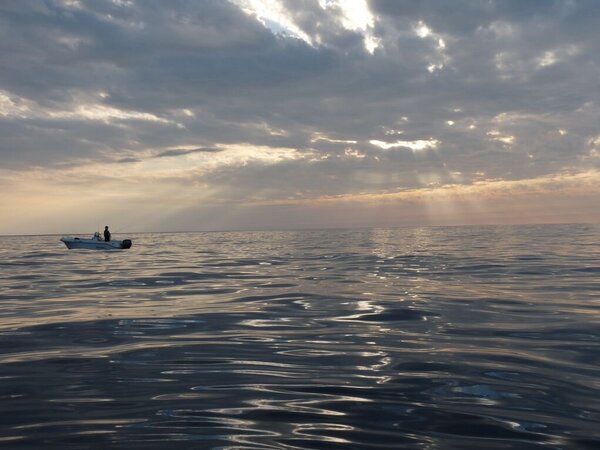
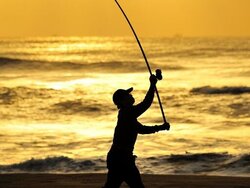
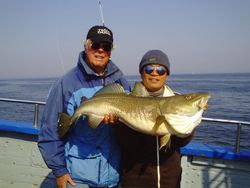
![[Translate to English:] Characterization of the recreational passive gear eel fishery](/media/_processed_/9/5/csm_1215_Charakterisierung-Aal-passiv-DCF___Manfred_Kreil_ee4a553b80.jpg)
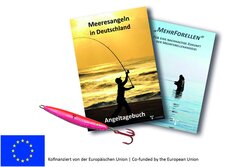
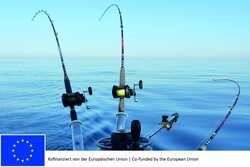
![[Translate to English:] Catch and release mortality of eel](/media/_processed_/0/4/csm_1611-Sterblichkeit_von_Aalen_5ab5894998.jpg)
